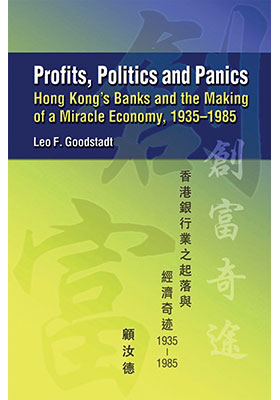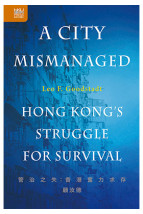Profits, Politics and Panics
Hong Kong’s Banks and the Making of a Miracle Economy, 1935–1985
(創富奇途:香港銀行業之起與落經濟奇績1935–1985)
ISBN : 978-962-209-896-1
October 2007
328 pages, 6″ x 9″
- HK$250.00
Ebooks
Also Available on
Between 1935 and 1985, Hong Kong’s growth seemed unstoppable. The economy flourished despite wars, revolution and Western protectionism to emerge as a world-class manufacturing exporter and an international financial centre. Yet, for bankers, these were troubled years, with bank runs, corporate scandals and the 1983 currency collapse. The crises were avoidable and caused by government blunders as well as the banks’ mismanagement. This book offers an absorbing account of a turbulent banking industry which will be compelling reading not only for bankers and corporate executives but for readers interested in government’s relations with business and the sources of Hong Kong’s economic success.
The author recounts the rise and fall of local Hong Kong banks, their disastrous funding of property and share ‘bubbles’ in the 1960s and their links to gold and drug smuggling. HSBC and foreign banks became the biggest beneficiaries of the post-war industrial boom but were hard hit by the corporate failures of the 1970s and 1980s. The book reveals hitherto undisclosed details of the complex financial relationship with China. Hong Kong’s banks supplied the hard currency needed by Beijing during the Cold War and the troubled Maoist era, thus laying the foundations for Hong Kong’s current role in financing China’s modernisation.
The author reassesses the British record and highlights the struggle for autonomy from London’s interference. But there are also startling disclosures about the shortcomings of such distinguished personalities as Sir John Cowperthwaite and Sir Philip Haddon-Cave, with costly consequences for the financial system and the community.
“The rise of Hong Kong as a major international financial centre under British rule, and as a borrowed place in a borrowed time, is an amazing story of successes and challenges. I have known Leo for many years and consider him one of the most knowledgeable scholars on Hong Kong’s financial and political history. He has a wonderful ability to cut through the maze of intricate political, economic and human factors that have interacted and shaped this tiny island’s financial and banking development. It therefore comes as no surprise that he has produced a book both analytical and highly readable.” –Vincent Cheng, Chairman, The Hongkong and Shanghai Banking Corporation Ltd
“This book is an important and timely contribution to the economic history of colonial Hong Kong. Written in a lively and controversial style, it draws on wide reading of the government archives, on secondary sources, and on the author’s unrivalled personal experience of Hong Kong. The issues of banking and economic governance remain highly topical and this book is essential reading for anyone concerned with economic and political development in contemporary Hong Kong.” —Christopher Howe, Research Professor, School of East Asian Studies, University of Sheffield
“Goodstadt brilliantly weaves a tapestry that resolves major puzzles about Hong Kong’s growth as an international financial centre during this pivotal fifty-year period. This is a devastating expose of the consequences of the British colonial government’s failure to effectively regulate banking and manage monetary policy. These consequences included repeated banking crises, gold smuggling, the drug trade, and corruption, and the demise of most of the local Chinese banks. The Hong Kong people’s extraordinary business acumen overcame government incompetence.” —David Meyer, author of Hong Kong as a Global Metropolis and Visiting Professor of Business, Washington University in St. Louis.
“An important and useful contribution to Hong Kong’s banking and colonial history, meticulously researched, and a must read for anyone who cares about for Hong Kong’s survival as an international financial centre.” —Andrew Sheng, Former Chairman of the Hong Kong Securities and Futures Commission, 1998–2005






